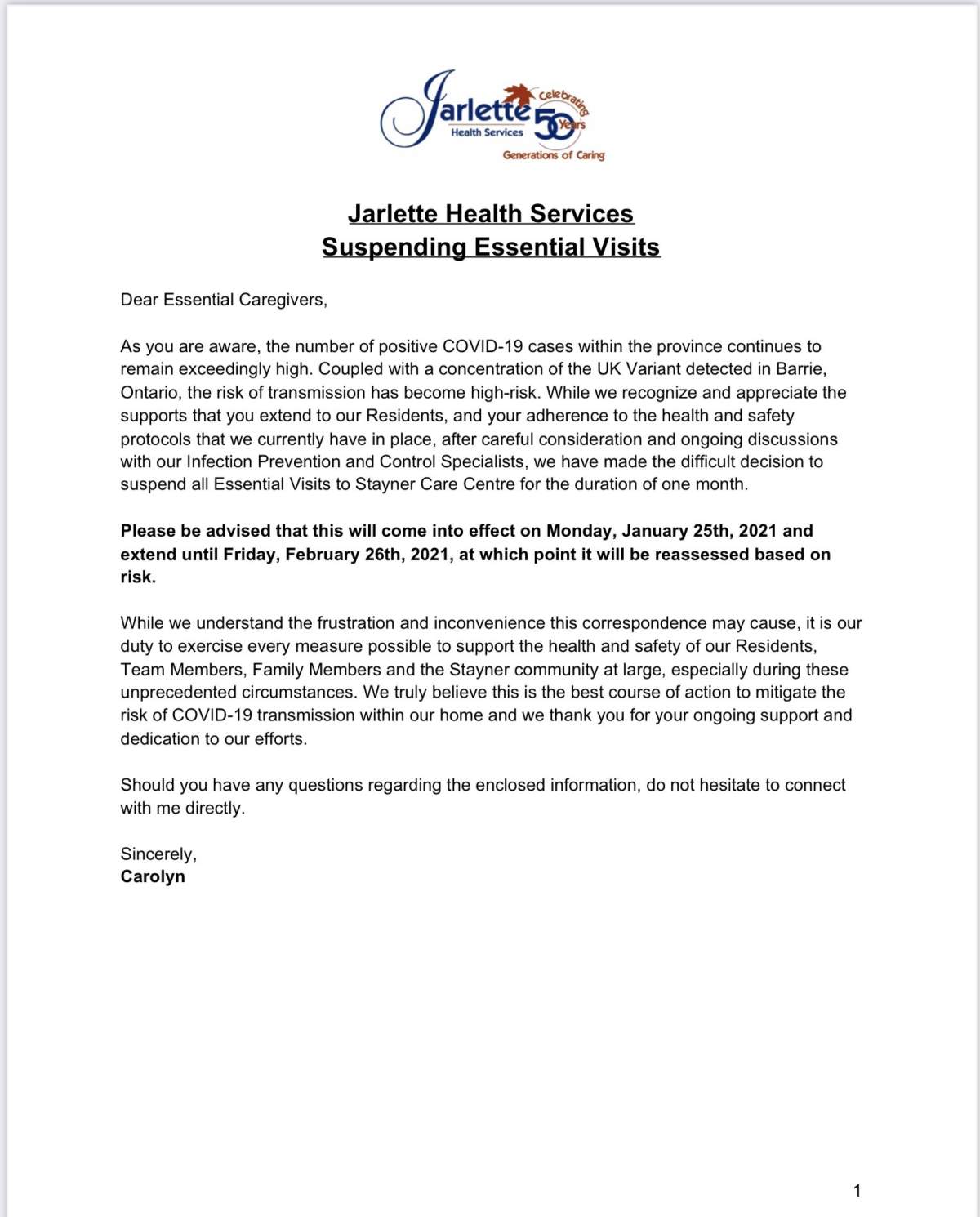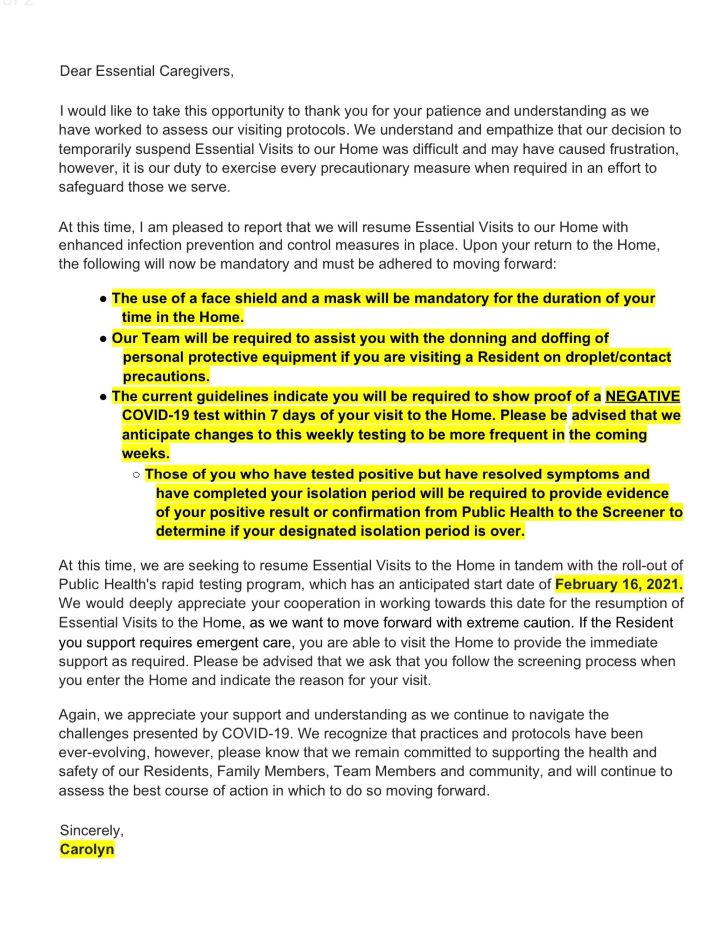The Ontario Health Coalition has called on the provincial government to stop long-term care companies from banning essential caregivers from visiting their loved ones as the province continues to see a dip in COVID-19 cases.

The organization said it’s heard from family members of Ontario nursing home residents that some facilities — many of which are for-profit — are stopping caregivers from entering and providing care.
In particular, the coalition said Jarlette Health Services, which owns 14 long-term care homes in Ontario, has suspended all access to essential caregivers, except for compassionate and palliative care reasons.
“At this difficult time, it is more important than ever that residents have access to essential caregivers for assistance and support,” Jane Meadus, a lawyer and institutional advocate at the Advocacy Centre for the Elderly, said in a statement.
“Under the Residents’ Bill of Rights in the LTC Homes Act, it is unlawful for homes to interfere with this right.”
Ontario nursing homes are required to ensure compliance with the provincial government’s Directive #3 with respect to essential visitors.

The long-term care policy, published on Dec. 26, says up to one caregiver can visit a resident in a nursing home if that facility is experiencing an outbreak or if it’s in a COVID-19 grey-lockdown, red-control or orange-restrict zone.
If a long-term care home is in a yellow-protect or green-prevent COVID-19 zone, up to two caregivers can visit.
“Essential caregivers can visit at any time, including during an outbreak, subject to direction from the local public health unit,” Rob McMahon, a spokesperson with Ontario’s Ministry of Long-Term Care, said in a statement.
“These units may provide further direction on the types and numbers of visitors to the homes to ensure the health and safety of all residents, staff and visitors.”

Get weekly health news
In a letter provided to Global News on Jan. 25, Stayner Care Centre’s director of care said essential visits to the home, owned by Jarlette Health Services, would be suspended for one month until Feb. 26.
“As you are aware the number of positive COVID-19 cases within the province continues to remain exceedingly high,” Carolyn McLeod, Stayner Care Centre’s director of care, said in the letter addressed to essential caregivers.
“Coupled with a concentration of the U.K. variant detected in Barrie, Ont., the risk of transmission has become high risk. While we recognize and appreciate the supports you extend to our residents, and your adherence to the health and safety protocols that we currently have in place, after careful consideration and ongoing discussions with our infection prevention and control specialists, we have made the difficult decision to suspend all essential visits.”

An essential caregiver provided the letter to Global News and asked not to be named for fear of retribution. They said they complained to their local public health unit and subsequently to Ontario’s Ministry of Long-Term Care regarding the change in visitor restrictions at Stayner Care Centre.
After the caregiver complained, they said they received a memo from the home that said it aims to resume essential visits in tandem with the rollout of rapid testing, which is expected to be fully operational by Feb. 16.
About a week later on Feb. 8, a letter from McLeod reiterated Stayner Care Centre expects to resume essential visits when the rapid testing program is anticipated to roll out on Feb. 16.
“We will resume essential visits to our home with enhanced infection prevention and control measures in place,” McLeod wrote in the letter.
In a statement, McMahon said Ontario’s long-term care ministry followed up with Jarlette and was advised the company is allowing essential caregivers in all its homes as of Feb. 5, with the exception of Roberta Place in Barrie, Ont., which has been the site of a devastating COVID-19 outbreak where the U.K. variant has been present.
“That exception was made on direction from the local public health unit,” McMahon wrote.
“If a visitor or resident has a complaint about the way a home is managing staffing, visitors or communications with family, the first step is to report the concern to the home.”
McMahon said nursing homes are required to have written steps to submit a complaint. When a complaint is received, McMahon said homes need to inform the complainant what they’re doing to resolve the issue, when the problem will be resolved and plans for the future.
“If reporting the concern to the home does not resolve the issue, individuals can call the family support and action line at 1-866-434-0144, which is open 8:30 a.m. to 7:00 p.m., seven days a week. The information will be provided to an inspector for follow-up.”
The executive director of the Ontario Health Coalition, Natalie Mehra, said locking out essential caregivers causes harm and implored the provincial government to intervene.
“While we understand the fear of the spread of the U.K. variant, the fact is that long-term care homes can set a policy of requiring and providing a stronger level of protection and PPE for essential caregivers,” she said in a statement.
Global News reached out to a spokesperson with Jarlette Health Services for comment but didn’t receive a response by time of publication.











Comments